- Home
- Deborah Harkness
A Discovery of Witches: A Novel (All Souls Trilogy) Page 7
A Discovery of Witches: A Novel (All Souls Trilogy) Read online
Page 7
He didn’t behave like an aloof genius when I cold-called him to ask why an alchemist might describe two substances heated in an alembic as growing branches like a tree. Nobody else in the chemistry department had been interested in helping me, but Chris sent two Ph.D. students to get the materials necessary to re-create the experiment, then insisted I come straight to the lab. We’d watched through the walls of a glass beaker while a lump of gray sludge underwent a glorious evolution into a red tree with hundreds of branches. We’d been friends ever since.
I took a deep breath. “I met someone the other day.”
Chris whooped. He’d been introducing me to men he’d met at the gym for years.
“There’s no romance,” I said hastily. “He’s a scientist.”
“A gorgeous scientist is exactly what you need. You need a challenge—and a life.”
“Look who’s talking. What time did you leave the lab yesterday? Besides, there’s already one gorgeous scientist in my life,” I teased.
“No changing the subject.”
“Oxford is such a small town, I’m bound to keep running into him. And he seems to be a big deal around here.” Not strictly true, I thought, crossing my fingers, but close enough. “I’ve looked up his work and can understand some of it, but I must be missing something, because it doesn’t seem to fit together.”
“Tell me he’s not an astrophysicist,” Chris said. “You know I’m weak on physics.”
“You’re supposed to be a genius.”
“I am,” he said promptly. “But my genius doesn’t extend to card games or physics. Name, please.” Chris tried to be patient, but no one’s brain moved fast enough for him.
“Matthew Clairmont.” His name caught in the back of my throat, just as the scent of cloves had the night before.
Chris whistled. “The elusive, reclusive Professor Clairmont.” Gooseflesh rose on my arms. “What did you do, put him under a spell with those eyes of yours?”
Since Chris didn’t know I was a witch, his use of the word “spell” was entirely accidental. “He admires my work on Boyle.”
“Right,” Chris scoffed. “You turned those crazy blue-and-gold starbursts on him and he was thinking about Boyle’s law? He’s a scientist, Diana, not a monk. And he is a big deal, incidentally.”
“Really?” I said faintly.
“Really. He was a phenom, just like you, and started publishing while he was still a grad student. Good stuff, not crap—work you’d be happy to have your name on if you managed to produce it over the course of a career.”
I scanned my notes, scratched out on a yellow legal pad. “This was his study of neural mechanisms and the prefrontal cortex?”
“You’ve done your homework,” he said approvingly. “I didn’t follow much of Clairmont’s early work—his chemistry is what interests me—but his publications on wolves caused a lot of excitement.”
“How come?”
“He had amazing instincts—why the wolves picked certain places to live, how they formed social groups, how they mated. It was almost like he was a wolf, too.”
“Maybe he is.” I tried to keep my voice light, but something bitter and envious bloomed in my mouth and it came out harshly instead.
Matthew Clairmont didn’t have a problem using his preternatural abilities and thirst for blood to advance his career. If the vampire had been making the decisions about Ashmole 782 on Friday night, he would have touched the manuscript’s illustrations. I was sure of it.
“It would have been easier to explain the quality of his work if he were a wolf,” Chris said patiently, ignoring my tone. “Since he isn’t, you just have to admit he’s very good. He was elected to the Royal Society on the basis of it, after they published his findings. People were calling him the next Attenborough. After that, he dropped out of sight for a while.”
I’ll bet he did. “Then he popped up again, doing evolution and chemistry?”
“Yeah, but his interest in evolution was a natural progression from the wolves.”
“So what is it about his chemistry that interests you?”
Chris’s voice got tentative. “Well, he’s behaving like a scientist does when he’s discovered something big.”
“I don’t understand.” I frowned.
“We get jumpy and weird. We hide in our labs and don’t go to conferences for fear we might say something and help someone else have a breakthrough.”
“You behave like wolves.” I now knew a great deal about wolves. The possessive, guarded behaviors Chris described fit the Norwegian wolf nicely.
“Exactly.” Chris laughed. “He hasn’t bitten anyone or been caught howling at the moon?”
“Not that I’m aware of,” I murmured. “Has Clairmont always been so reclusive?”
“I’m the wrong person to ask,” Chris admitted. “He does have a medical degree, and must have seen patients, although he never had any reputation as a clinician. And the wolves liked him. But he hasn’t been at any of the obvious conferences in the past three years.” He paused. “Wait a minute, though, there was something a few years back.”
“What?”
“He gave a paper—I can’t remember the particulars—and a woman asked him a question. It was a smart question, but he was dismissive. She was persistent. He got irritated and then mad. A friend who was there said he’d never seen anybody go from courteous to furious so fast.”
I was already typing, trying to find information about the controversy. “Dr. Jekyll and Mr. Hyde, huh? There’s no sign of the ruckus online.”
“I’m not surprised. Chemists don’t air their dirty laundry in public. It hurts all of us at grant time. We don’t want the bureaucrats thinking we’re high-strung megalomaniacs. We leave that to the physicists.”
“Does Clairmont get grants?”
“Oho. Yes. He’s funded up to his eyeballs. Don’t you worry about Professor Clairmont’s career. He may have a reputation for being contemptuous of women, but it hasn’t dried up the money. His work is too good for that.”
“Have you ever met him?” I asked, hoping to get Chris’s judgment of Clairmont’s character.
“No. You probably couldn’t find more than a few dozen people who could claim they had. He doesn’t teach. There are lots of stories, though—he doesn’t like women, he’s an intellectual snob, he doesn’t answer his mail, he doesn’t take on research students.”
“Sounds like you think that’s all nonsense.”
“Not nonsense,” Chris said thoughtfully. “I’m just not sure it matters, given that he might be the one to unlock the secrets of evolution or cure Parkinson’s disease.”
“You make him sound like a cross between Salk and Darwin.”
“Not a bad analogy, actually.”
“He’s that good?” I thought of Clairmont studying the Needham papers with ferocious concentration and suspected he was better than good.
“Yes.” Chris dropped his voice. “If I were a betting man, I’d put down a hundred dollars that he’ll win a Nobel before he dies.”
Chris was a genius, but he didn’t know that Matthew Clairmont was a vampire. There would be no Nobel—the vampire would see to that, to preserve his anonymity. Nobel Prize winners have their photos taken.
“It’s a bet,” I said with a laugh.
“You should start saving up, Diana, because you’re going to lose this one.” Chris chuckled.
He’d lost our last wager. I’d bet him fifty dollars that he’d be tenured before I was. His money was stuck inside the same frame that held his picture, taken the morning the MacArthur Foundation had called. In it, Chris was dragging his hands over his tight black curls, a sheepish smile lighting his dark face. His tenure had followed nine months later.
“Thanks, Chris. You’ve been a big help,” I said sincerely. “You should get back to the kids. They’ve probably blown something up by now.”
“Yeah, I should check on them. The fire alarms haven’t gone off, which is a good sign.” He he
sitated. “’Fess up, Diana. You’re not worried about saying the wrong thing if you see Matthew Clairmont at a cocktail party. This is how you behave when you’re working on a research problem. What is it about him that’s hooked your imagination?”
Sometimes Chris seemed to suspect I was different. But there was no way to tell him the truth.
“I have a weakness for smart men.”
He sighed. “Okay, don’t tell me. You’re a terrible liar, you know. But be careful. If he breaks your heart, I’ll have to kick his ass, and this is a busy semester for me.”
“Matthew Clairmont isn’t going to break my heart,” I insisted. “He’s a colleague—one with broad reading interests, that’s all.”
“For someone so smart, you really are clueless. I bet you ten dollars he asks you out before the week is over.”
I laughed. “Are you ever going to learn? Ten dollars, then—or the equivalent in British sterling—when I win.”
We said our good-byes. I still didn’t know much about Matthew Clairmont—but I had a better sense of the questions that remained, most important among them being why someone working on a breakthrough in evolution would be interested in seventeenth-century alchemy.
I surfed the Internet until my eyes were too tired to continue. When the clocks struck midnight, I was surrounded by notes on wolves and genetics but was no closer to unraveling the mystery of Matthew Clairmont’s interest in Ashmole 782.
Chapter 6
The next morning was gray and much more typical of early autumn. All I wanted to do was cocoon myself in layers of sweaters and stay in my rooms.
One glance at the heavy weather convinced me not to return to the river. I set out for a run instead, waving at the night porter in the lodge, who gave me an incredulous look followed by an encouraging thumbs-up.
With each slap of my feet on the sidewalk, some stiffness left my body. By the time they reached the gravel paths of the University Parks, I was breathing deeply and felt relaxed and ready for a long day in the library—no matter how many creatures were gathered there.
When I got back, the porter stopped me. “Dr. Bishop?”
“Yes?”
“I’m sorry about turning your friend away last night, but it’s college policy. Next time you’re having guests, let us know and we’ll send them straight up.”
The clearheadedness from my run evaporated.
“Was it a man or a woman?” I asked sharply.
“A woman.”
My shoulders floated down from around my ears.
“She seemed perfectly nice, and I always like Australians. They’re friendly without being, you know . . . ” The porter trailed off, but his meaning was clear. Australians were like Americans—but not so pushy. “We did call up to your rooms.”
I frowned. I’d switched off the phone’s ringer, because Sarah never calculated the time difference between Madison and Oxford correctly and was always calling in the middle of the night. That explained it.
“Thank you for letting me know. I’ll be sure to tell you about any future visitors,” I promised.
Back in my rooms, I flipped on the bathroom light and saw that the past two days had taken a toll. The circles that had appeared under my eyes yesterday had now blossomed into something resembling bruises. I checked my arm for bruises, too, and was surprised not to find any. The vampire’s grip had been so strong that I was sure Clairmont had broken the blood vessels under the skin.
I showered and dressed in loose trousers and a turtleneck. Their unalleviated black accentuated my height and minimized my athletic build, but it also made me resemble a corpse, so I tied a soft periwinkle sweater around my shoulders. That made the circles under my eyes look bluer, but at least I no longer looked dead. My hair threatened to stand straight up from my head and crackled every time I moved. The only solution for it was to scrape it back into a messy knot at the nape of my neck.
Clairmont’s trolley had been stuffed with manuscripts, and I was resigned to seeing him in Duke Humfrey’s Reading Room. I approached the call desk with shoulders squared.
Once again the supervisor and both attendants were flapping around like nervous birds. This time their activity was focused on the triangle between the call desk, the manuscript card catalogs, and the supervisor’s office. They carried stacks of boxes and pushed carts loaded with manuscripts under the watchful eyes of the gargoyles and into the first three bays of ancient desks.
“Thank you, Sean.” Clairmont’s deep, courteous voice floated from their depths.
The good news was that I would no longer have to share a desk with a vampire.
The bad news was that I couldn’t enter or leave the library—or call a book or manuscript—without Clairmont’s tracking my every move. And today he had backup.
A diminutive girl was stacking up papers and file folders in the second alcove. She was dressed in a long, baggy brown sweater that reached almost to her knees. When she turned, I was startled to see a full-grown adult. Her eyes were amber and black, and as cold as frostbite.
Even without their touch, her luminous, pale skin and unnaturally thick, glossy hair gave her away as a vampire. Snaky waves of it undulated around her face and over her shoulders. She took a step toward me, making no effort to disguise the swift, sure movements, and gave me a withering glance. This was clearly not where she wanted to be, and she blamed me.
“Miriam,” Clairmont called softly, walking out into the center aisle. He stopped short, and a polite smile shaped his lips. “Dr. Bishop. Good morning.” He raked his fingers through his hair, which only made it look more artfully tousled. I patted my own hair self-consciously and tucked a stray strand behind my ear.
“Good morning, Professor Clairmont. Back again, I see.”
“Yes. But today I won’t be joining you in the Selden End. They’ve been able to accommodate us here, where we won’t disturb anyone.”
The female vampire rapped a stack of papers sharply against the top of the desk.
Clairmont smiled. “May I introduce my research colleague, Dr. Miriam Shephard. Miriam, this is Dr. Diana Bishop.”
“Dr. Bishop,” Miriam said coolly, extending her hand in my direction. I took it and felt a shock at the contrast between her tiny, cold hand and my own larger, warmer one. I began to draw back, but her grip grew firmer, crushing the bones together. When she finally let go, I had to resist the urge to shake out my hand.
“Dr. Shephard.” The three of us stood awkwardly. What were you supposed to ask a vampire first thing in the morning? I fell back on human platitudes. “I should really get to work.”
“Have a productive day,” Clairmont said, his nod as cool as Miriam’s greeting.
Mr. Johnson appeared at my elbow, my small stack of gray boxes waiting in his arms.
“We’ve got you in A4 today, Dr. Bishop,” he said with a pleased puff of his cheeks. “I’ll just carry these back for you.” Clairmont’s shoulders were so broad that I couldn’t see around him to tell if there were bound manuscripts on his desk. I stifled my curiosity and followed the reading-room supervisor to my familiar seat in the Selden End.
Even without Clairmont sitting across from me, I was acutely aware of him as I took out my pencils and turned on my computer. My back to the empty room, I picked up the first box, pulled out the leather-bound manuscript, and placed it in the cradle.
The familiar task of reading and taking notes soon absorbed my attention, and I finished with the first manuscript in less than two hours. My watch revealed that it was not yet eleven. There was still time for another before lunch.
The manuscript inside the next box was smaller than the last, but it contained interesting sketches of alchemical apparatus and snippets of chemical procedures that read like some unholy combination of Joy of Cooking and a poisoner’s notebook. “Take your pot of mercury and seethe it over a flame for three hours,” began one set of instructions, “and when it has joined with the Philosophical Child take it and let it putrefy until the Bla
ck Crow carries it away to its death.” My fingers flew over the keyboard, picking up momentum as the minutes ticked by.
I had prepared myself to be stared at today by every creature imaginable. But when the clocks chimed one, I was still virtually alone in the Selden End. The only other reader was a graduate student wearing a red-, white-, and blue-striped Keble College scarf. He stared morosely at a stack of rare books without reading them and bit his nails with occasional loud clicks.
After filling out two new request slips and packing up my manuscripts, I left my seat for lunch, satisfied with the morning’s accomplishments. Gillian Chamberlain stared at me malevolently from an uncomfortable-looking seat near the ancient clock as I passed by, the two female vampires from yesterday drove icicles into my skin, and the daemon from the music reference room had picked up two other daemons. The three of them were dismantling a microfilm reader, the parts scattered all around them and a roll of film unspooling, unnoticed, on the floor at their feet.
Clairmont and his vampire assistant were still stationed near the reading room’s call desk. The vampire claimed that the creatures were flocking to me, not to him. But their behavior today suggested otherwise, I thought with triumph.
While I was returning my manuscripts, Matthew Clairmont eyed me coldly. It took a considerable effort, but I refrained from acknowledging him.
“All done with these?” Sean asked.
“Yes. There are still two more at my desk. If I could have these as well, that would be great.” I handed over the slips. “Do you want to join me for lunch?”
“Valerie just stepped out. I’m stuck here for a while, I’m afraid,” he said with regret.
“Next time.” Gripping my wallet, I turned to leave.
Clairmont’s low voice stopped me in my tracks. “Miriam, it’s lunchtime.”
“I’m not hungry,” she said in a clear, melodic soprano that contained a rumble of anger.
“The fresh air will improve your concentration.” The note of command in Clairmont’s voice was indisputable. Miriam sighed loudly, snapped her pencil onto her desk, and emerged from the shadows to follow me.

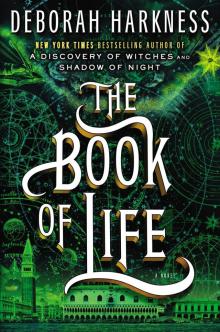 The Book of Life
The Book of Life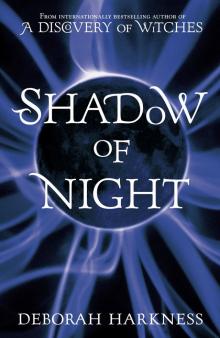 Shadow of Night
Shadow of Night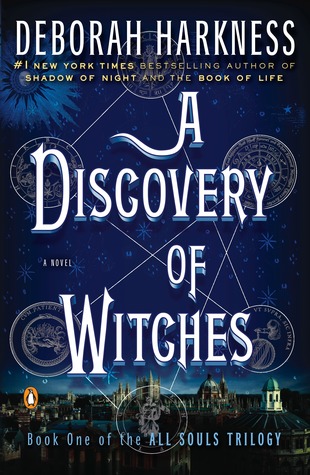 A Discovery of Witches
A Discovery of Witches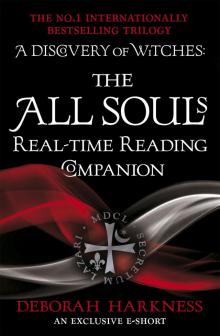 The All Souls Real-Time Reading Companion
The All Souls Real-Time Reading Companion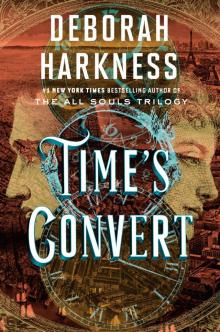 Time's Convert
Time's Convert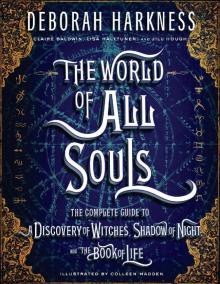 The World of All Souls
The World of All Souls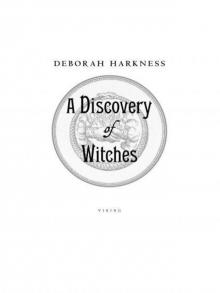 A Discovery of Witches: A Novel (All Souls Trilogy)
A Discovery of Witches: A Novel (All Souls Trilogy)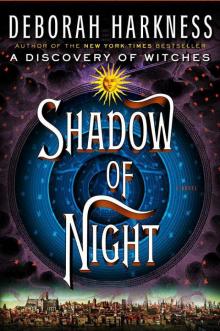 Shadow of Night: A Novel
Shadow of Night: A Novel